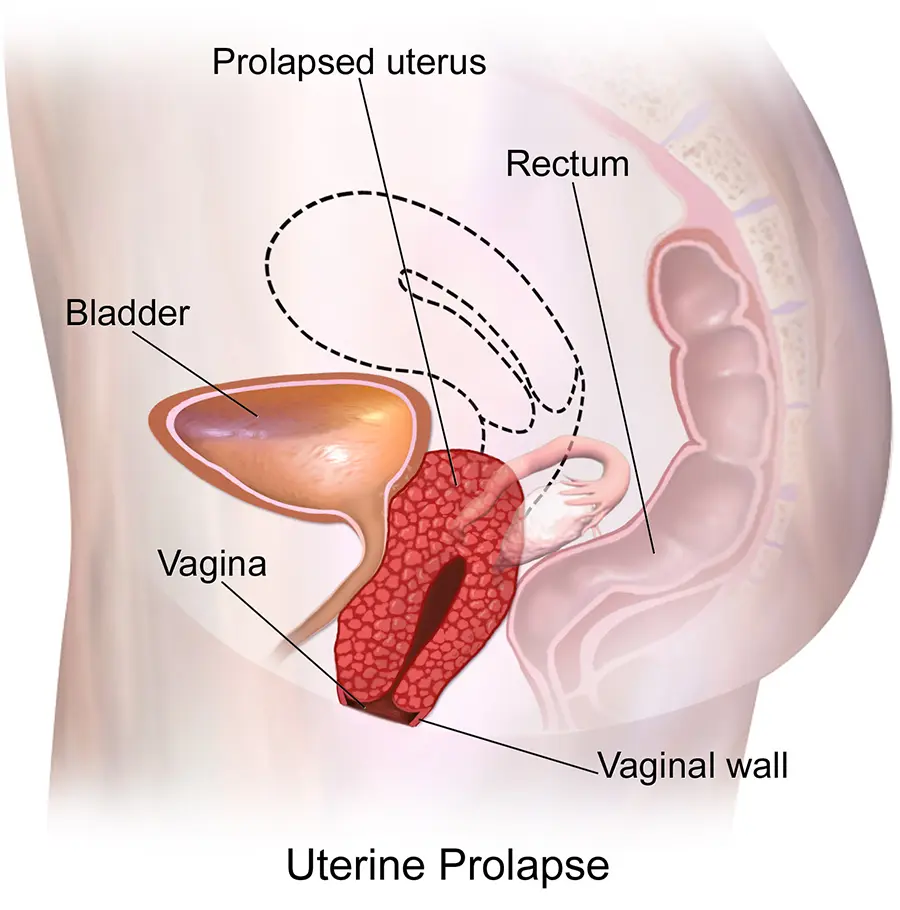Gynecology
- Home
- /
- Gynecology
- /
- Pelvic Organ Prolapse

Pelvic Organ Prolapse Treatment
If one or more of your pelvic organs is dropping or pressing into or out of your vagina, our pelvic organ prolapse treatment can repair your muscles and tissues. Tell your doctor about your symptoms as this condition is treatable.
Symptoms include:
- Aching, pressure, or discomfort in the pelvic
- Incontinence or bowel movement problems
- A feeling something's coming out of the vagina
Pelvic Organ Prolapse Treatment
If one or more of your pelvic organs is dropping or pressing into or out of your vagina, our pelvic organ prolapse treatment can repair your muscles and tissues. Tell your doctor about your symptoms as this condition is treatable.
Symptoms include:
- Aching, pressure, or discomfort in the pelvic
- Incontinence or bowel movement problems
- A feeling something's coming out of the vagina
Questions About Pelvic Organ Prolapse and Treatment
Pelvic organ prolapse happens when the muscles and tissues supporting the pelvic organs (the uterus, bladder, or rectum) become weak or loose. This allows one or more of the pelvic organs to drop or press into or out of the vagina.
Pelvic organ prolapse is less common than urinary or fecal incontinence but affects almost 3% of U.S. women. This condition happens more often in older women and in white and Hispanic women than in younger women or women of other racial and ethnic groups.
The pressure from prolapse can cause a bulge in the vagina that can sometimes be felt or seen. Women with pelvic organ prolapse may feel uncomfortable pressure during physical activity or sex.
Other symptoms of pelvic organ prolapse include:
- Seeing or feeling a bulge or “something coming out” of the vagina
- A feeling of pressure, discomfort, aching, or fullness in the pelvis
- Pelvic pressure that gets worse with standing or coughing or as the day goes on
- Incontinence or problems having a bowel movement
- Problems inserting tampons
Some women say that their symptoms are worse at certain times of the day, during physical activity, or after standing for a long time. Talk to one of our gynecologists about a pelvic organ prophase treatment that’s tailored to your symptoms.
- Maintain a healthy weight. Women who are overweight are more likely to have pelvic problems.
- Choose foods with fiber. Fiber helps prevent constipation and straining during bowel movements.
- Do not smoke. Smoking can lead to chronic cough, which puts stress on the pelvic muscles.
- Giving birth to a baby weighing more than 8.5 pounds
- Aging
- Family history
- Vaginal childbirth
- Hormonal changes during menopause
- Surgery to close the vagina.
- Pelvic floor muscle exercises.
- Changing eating habits.
- Surgery to support the uterus or vagina.
- Pessary. A removable device inserted into the vagina to support the pelvic organs.

Pelvic Organ Prolapse & Repair Specialist
Pelvic organ prolapse is a very common disorder, especially among older women. This condition can be diagnosed based on the onset of symptoms and a pelvic exam, and management options include medical and surgical treatment. Even though medical treatment cannot correct the abnormal herniation of the pelvic structures, this can help alleviate symptoms.
For a diagnosis from a specialist, visit Riverwalk OBGYN in San Antonio, Texas. With reconstructive and rejuvenation procedures, our practice helps women restore normal function in their reproductive organs and live normal, healthy lives.
Why You Need a Well Woman Exam
Unlike doctor’s appointments and regular physicals, a woman’s wellness exam is focused around the health of your breasts, uterus, cervix, and vagina. While your overall health is taken into account, the main purpose of a woman’s wellness exam is your reproductive health.
In general, your exam should include a breast exam, pap smear, and a pelvic exam. Because these exams can catch early signs of cancer or other health problems, they are essential.
